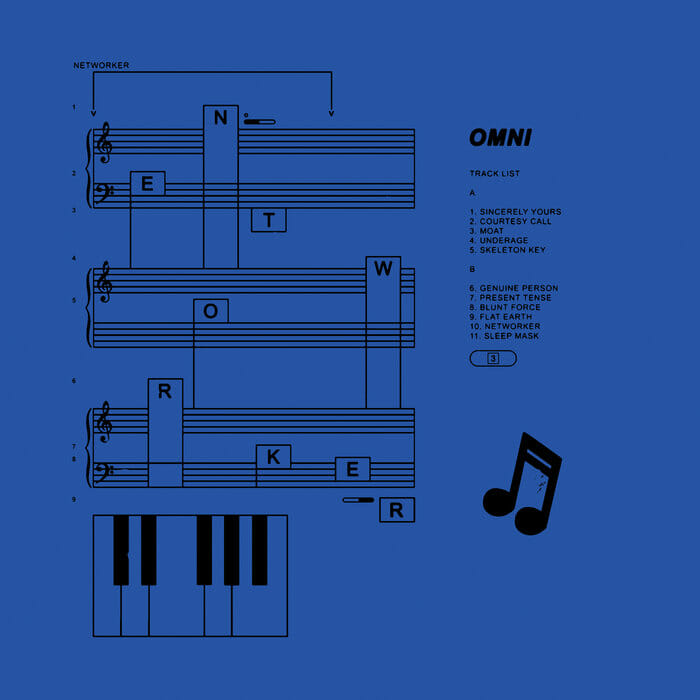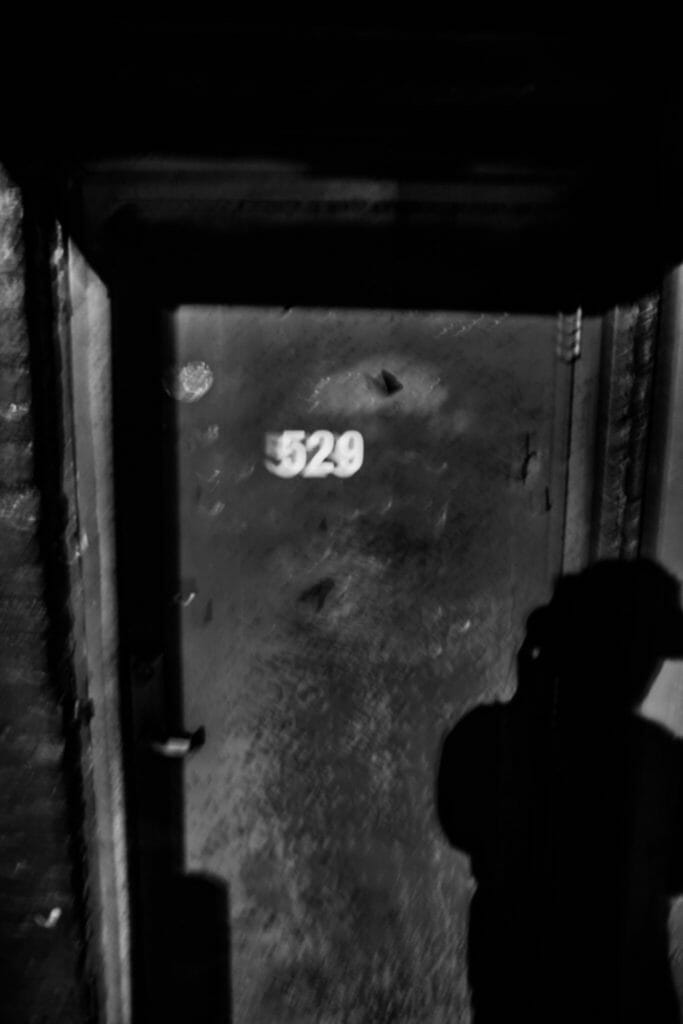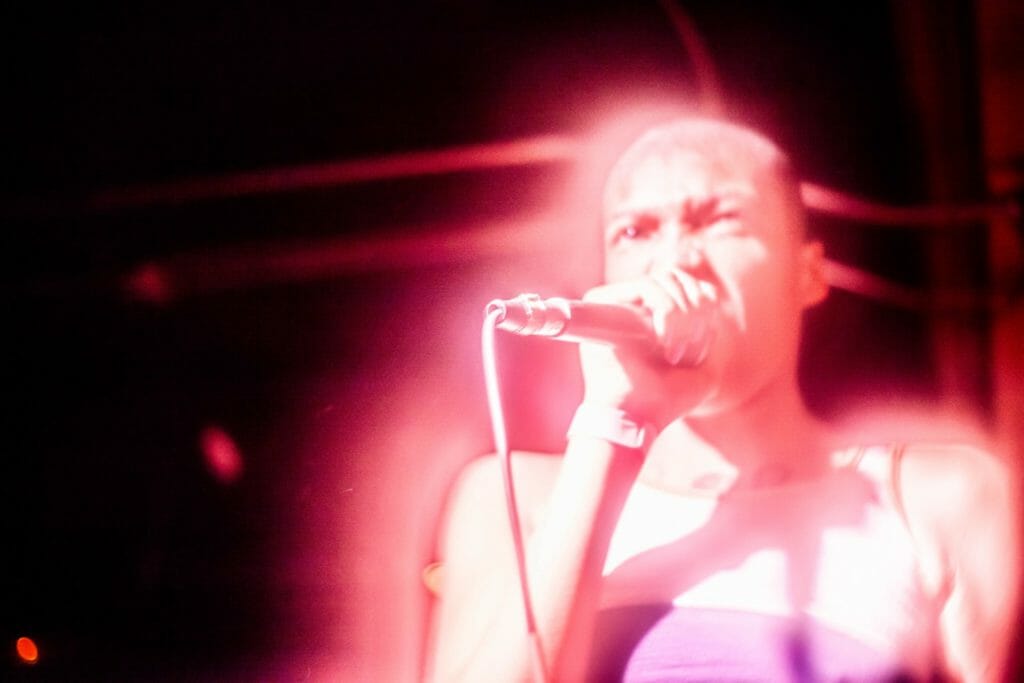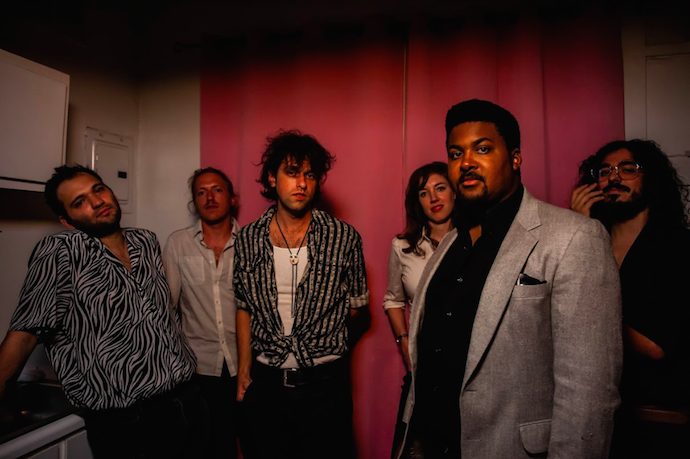This article was written by Aja Arnold with Autumn James.

Omni-
combining form
all; of all things
There is no back-up plan.
Better yet, there can’t be a back-up plan.
I watched Omni play its album release show in early November in support of its third album, the newly-minted Networker (released on Nov. 1, 2019, via Sub Pop), from the EARL’s sound booth in East Atlanta Village. Frontman/bassist Philip Frobos, guitarist Frankie Broyles, and drummer Chris Yonkers had returned from Raleigh, N.C., just a few hours before, finishing the eastern leg of their U.S. tour in anticipation of the new album. The band was set to embark on its European tour in less than a week, immediately followed by a U.S. west coast leg in the beginning of December. Needless to say, Omni is busy as shit, living out the dream of “finding success” as an indie band. And the first to do so in a way that Atlanta indie rock hasn’t seen in quite some time.
Signing with Sub Pop is part of it, although the band didn’t have much to say about working with the esteemed label other than that it made touring and recording easier, since it allowed them to devote all their time and energy to the work. It should be noted here that “success” is not the same as “fame.” While one can come with the other, they are not necessarily intertwined. Massive fame typically isn’t regarded as success in the world of independent music; in fact, it can be a full-blown nightmare. In the case of Omni, success means being able to let go of that side hustle, being able to pay your bills through your music, and even having a little extra money to take yourself and your partner out for a drink.
It really is about the simple things. And being able to tour in Europe all the time is pretty dope, too.
Back to that night at the EARL: it was a Saturday night crowd on a Monday evening, fully attended, and the lineup was complete with Atlanta’s up-and-coming Latinx punk trio Yukons and lo-fi indie sweethearts Kibi James. As I stood from the sound booth, I watched over a little sea of bobbing heads as Omni kicked its set off with what is now considered one of their classics, “Southbound Station,” opening track of the 2017 sophomore album Multi-Task. Prior to their set, Philip and Frankie told me a couple stories from their preceding tour, including instances involving kids volunteering—some practically begging on Instagram—to play parts on their songs live on stage. I gazed over these bobbing heads, wondering if any of those types were there. I was still a bit mystified, as I’d always been, by Omni and where exactly its captivation lies.
Watching Omni take off has been somewhat surreal, especially as a spectator in the band’s origin city that was home to Philip and Frankie’s starter bands, Carnivores and Balkans, respectively, from their inception to ultimate dissolution. Carnivores and Balkans were circulating in the Atlanta music scene around the same time, circa 2009 to 2013, and each gained a notable following and mild success before breaking up.
“In Carnivores, we did some good work and always were trying to push ourselves and make a name,” Philip said in our interview, conducted via email while he was on the road for Omni’s eastern U.S. tour. “However, sometimes we would go too far to prove it, at times wasting our own time and money. In Omni, we never put anything on the line. We decided to let it grow naturally and follow it where it took us.”
Having known Philip casually for a long time through Atlanta music—dating back to the scene’s earlier, formative years marked by bands such as the Selmanaires, the Black Lips, the Coathangers, et al.—his recollection of the trial and error of Carnivores’ lifespan rings true. But nothing between Carnivores and Balkans’ experiences were in vain, as there were a lot of connections that turned into friendships and later, opportunities. The collaborative union between Philip and Frankie surprised no one and made a lot of sense. Ultimately, it’s that union and bond that’s kept this band running in—to steal a line from Networker—what has been a steady pursuit.
However, the connections they made as a result of hard work (and a little bit of luck) help. The band was picked up as selected openers for a Franz Ferdinand tour in 2017—a connection made through Carnivores, who toured with Franz in 2012. Through touring a lot in the early days, Omni gained a lot of exposure, and seemingly to us, in a flash, Omni began to blow up. Not only did they blow up; they were pigeonholed. Next thing we knew, Atlanta was home to the best post-punk revival band that anyone had ever heard and that almost every music press outlet was gushing over, each without fail lumping Omni in with the most obvious post-punk mainstays of Gang of Four, Devo, and Wire.
Coming from the reference points of Carnivores and Balkans, and having been to a slew of shows in our late teens and early 20s at the teeny-tiny 529 and someone’s house, this was frankly a little off-putting, confusing, and seemed… well, lazy, on the music writers’ part. (If we read the word “angular” one more time…) Because there’s something about Omni that is encompassing, magnetic, and yet, seems to get overlooked. Also, knowing Philip and Frankie and being familiar with their influences, it seemed unlikely to us that Omni set out to sound like “angular post-punk.” So we asked.
“There’s a groovy aspect to what we’ve always done that I’m not sure why always falls through the cracks,” said Philip in an interview when we asked if this “angular sound” and comparison was constructed on purpose. “Not on purpose,” Frankie added. “We like those bands, but we never set out to sound like them.”
Truth be told, music critics may have jumped the gun with Multi-Task. The sophomore album, released via independent Chicago label Trouble in Mind, is solid, catchy, and infectious, but it wasn’t groundbreaking. Was it Gang of Four-Devo-Wire sounding? Sure. Was it well-produced and executed? Absolutely. But there was something about it that felt off. However, we didn’t truly know that until we heard Networker—just like you don’t really notice an air conditioner humming in the background until it powers off. Upon hearing the album’s opener, “Sincerely Yours,” with Philip’s slick bass and Frankie’s quick yet lustrous guitar, it feels like we’ve finally arrived at what Omni actually is. Networker isn’t some post-punk mock-up and shouldn’t be construed as such; it encompasses many more influences while combining various forms of sound and production, and is truly the most diverse we’ve heard Omni’s sound yet.

With Neworker, let the pigeonholes be disassembled. While Multi-Task may have incorporated some funk and groovy stuff, it was somehow lost in the shuffle and didn’t shine through. Omni’s sound has always been sharp, busy, and frenetic, with Philip’s proficient bass playing combined with Frankie’s renowned and trademark technical-borderline-mathematical guitar playing. There’s always been complicated riffs and lots of movement, and that’s perhaps what’s distracted many from the underlying layers that give Omni such a gravitational pull.
Philip’s bass parts definitely push Omni’s sound into post-punk territory, but Frankie’s guitar and music writing is more defined by early Paul McCartney and other early ‘70s pop sounds, adding a very substantial pop component to Omni’s overall composure. In response to all the “math-y” comparisons, there’s really nothing technical or methodical about the songwriting. Outside the Earl that November evening, both Philip and Frankie chuckled, saying they were “pretty bad at math” and there’s “nothing more than one’s and two’s” in their songs. Further, if you were to drain out the lo-fi sound in Networker, the album would likely wage more Steely Dan comparisons, especially with the emphasis of keys on this record, such as on the album’s single, “Courtesy Call,” and deep cut “Sleep Mask.”
There are a lot of moving parts to Omni, and generally we know that when we’re talking about this band, we are talking about Philip and Frankie. Musically, they know how to work together; each knows what the other is going for and they know how to fill in one another’s gaps. But another person that’s been looming behind the production scenes of Omni through all its records is longtime friend and former Carnivores guitarist, Nathaniel Higgins, who grants Omni’s formula with even more depth and collaborative intuitiveness. Nathaniel places himself in the “Steve Albini camp,” considering himself a recorder and audio engineer for the band rather than a producer.
“In Networker, we took a much more measured approach,” says Nathaniel, speaking of the experience recording the album at Frankie’s cabin in Vienna, Ga., about two hours south of Atlanta. “Hall & Oates and the $300 drum sound on ‘Sara Smile’ was our starting place. Frank wanted the drums as dry as possible. We didn’t end up doing the Hall & Oates sound entirely… I had no separation between me and the drums, so we’re talking hours of a snare drum in your face. Trying times for sure.”
Philip knew this album was the time to push past their original bounds, telling us that “this was the first record where we started considering ‘let’s not re-write that song’ a priority.” With the end result, this is extremely evident.
Where Multi-Task was jittery, Networker is smooth. Where Multi-Task is anxious, Networker is more composed. This album is produced in a more thoughtful way that Multi-Task was not, replacing formula with feeling and calculation with intuition. It’s not that any of the preceding factors that made Multi-Task a noteworthy album are lost in Networker; it’s simply that Networker rings with much more clarity about what Omni actually is. While Multi-Task felt like a continuation and rehashing of the band’s 2016 debut album, De-luxe, that we didn’t really need—serving up more of the same Omni we’d already heard—Networker is a fully executed expansion that feels like we are truly hearing Omni for the first time, curtains pulled back, rigidity broken through.
This evolution of Omni’s sound is best exemplified by “Underage,” which sheds all the production’s instrumental layers in one compact, illustrious go in the most fulfilling “Band on the Run” way. This track, along with “Skeleton Key” and “Present Tense,” shows the best of Philip’s vocals, and the album overall shows that Philip has mastered his delivery. Philip’s voice has always served as a relatively stark, deadpan contrast to the band’s energetic sound. But on this album, it’s complimentary, controlled, and magnified. “Flat Earth” lends itself to the expected Omnian sound—apprehensive, wired, edgy—but the album quickly shifts gears in the title track, circling back to smooth electric guitar arcs with keys meandering softly underneath, bringing the sweetest, most satisfying resolve that’s typical of the entire album’s sound. This record is smart, vulnerable, and edgy all at once—a refreshing change of pace for Omni, softening and refining those once jagged edges. The only thing vaguely post-punk about this record is its lo-fi production, and this is a good thing. Because the world doesn’t need more post-punk revival bands; it needs more authenticity and originality, which is what Networker brings.
In more or less words, Omni cracked its own code, and its success is bound to bloom some more. This is the result of extremely real effort and not stopping. Omni has never taken a break, even before it was Omni; Philip and Frankie have never stopped creating and have never really stopped touring, either. The band’s lifespan is now approaching the amount of time that Balkans and Carnivores really had momentum, and that’s part of what’s making it hit big. Not only is Omni successful, it’s long-lasting, which, for some in Atlanta, was unexpected. Not because anyone thought they didn’t possess the talent or ability to do it. It’s simply that we don’t see it very often, and some of us had become jaded to the fact that no one could recapture the magic of ATL indie music’s hey-day—which is why some of us cling to those old Balkans 7-inches so dearly.
“We both learned a lot from our first bands,” said Frankie. “After Balkans, I definitely had a clearer idea of what I wanted to do with music. When starting Omni, we wanted to keep things as casual as possible. Touring has done a lot for us. I think you just have to be willing to put in the work.” Philip added that touring has not only been instrumental in their success, but necessary as a band residing in Atlanta. “It’s simply that all of the industry is a minimum of 12 hours away, so you have to be willing to put the effort into making those drives,” he told us.
Philip had actually “given up” for a short period before Omni really happened and briefly pursued a mobile coffee cart business, Pull Espresso Bar, in Atlanta. Omni, then called Landline, was on the periphery of existence, beginning very casually with no other goals in mind other than making the music Philip and Frankie wanted to make.
“I guess before Omni, it kinda felt like I had given up,” Philip recalled. “It was weird to talk about how ‘I used to be in a band.’ It was such a big part of my identity, which is why I loved writing songs with Frankie on the side. Pull Espresso Bar that I used to be a partner in sort of was the back-up plan. It was a big responsibility and when we signed with Trouble in Mind, I decided it was time to give music a whole-hearted go once more and sold my part. Since then, we’ve been so busy there hasn’t been time to think of giving up.”
Frankie added to this, explaining, “I’ve never really considered giving up. I’m not sure what that would even look like. [There was] no real back-up plan. Like they say, better to not have a back-up plan. I guess music is more so something I need to do, rather than something I choose to do.”
Omni never truly had a back-up plan, because they couldn’t have a back-up plan. Having a back-up plan sets up an expectation of failure and is characterized by self-doubt and distrust. At the end of the day, it’s not the things Omni’s accomplished that makes its story stand out; it\’s the motivation, connection, and sense of faith that eventually things were going to click that made this endgame even possible. And that’s what makes listening to Networker, which surpasses its predecessors in all aspects, so gratifying—Omni fucking did it.




